Fishing the moment
Logic suggests that locals should dominate tour-level events, but the stats prove otherwise. So we asked several top pros to explain why, and they revealed that fishing “in the moment” always trumps “fishing memories” on the tournament trail.
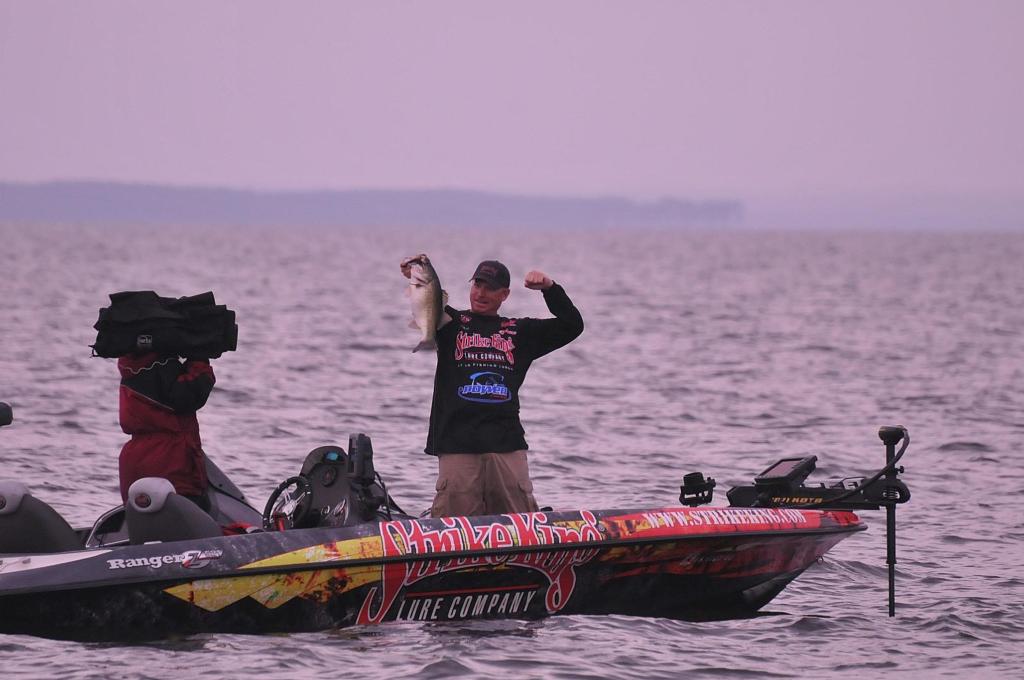
(Editor’s note: This article originally appeared in the 2013 March issue of Bass Fishing magazine. To read more compelling articles from Bass Fishing magazine each month, become an FLW subscriber member. If you’d like to sign up for a digital subscription to access articles online, click here).
When you analyze professional bass tournaments from a purely logical perspective, it stands to reason that he who has the most experience on a lake will have the biggest advantage in a four-day competition there.
However, an analysis of 10 years of FLW tournament records proves otherwise. Counting back through the last 100 Walmart FLW Tour Major, Walmart FLW Tour Open and Walmart FLW Series events shows that only 16 times has what I deem to be a local won an event. A “local” is defined as any angler who lives on or near the lake for a significant portion of the year, or any angler who considers that lake to be his home fishery.
How is it then that locals get beat so often? How can anglers who have never laid eyes on a lake come in and win tournaments against guys who have years of experience there?
The answer, according to a few of today’s top pros, rests in the ability to “fish the moment;” that is, to tap into the current behavior of bass and not what they were doing last year, last week or even yesterday. Success comes to those who correctly answer the question, “What’s happening right now?”
Learning from locals
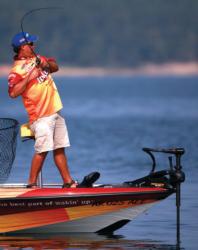 Walmart FLW Tour pros Terry Bolton and Scott Suggs, who will forever be regarded as local favorites on their respective lakes, nevertheless can help explain why being able to fish the moment can be more potent than local knowledge.
Walmart FLW Tour pros Terry Bolton and Scott Suggs, who will forever be regarded as local favorites on their respective lakes, nevertheless can help explain why being able to fish the moment can be more potent than local knowledge.
Bolton grew up on the shores of Kentucky Lake, and Suggs’ name is synonymous with Lake Ouachita. Both have won events on their home lakes, including Suggs’ $1 million Forrest Wood Cup win in 2007, but the number of times they have been beaten by out-of-towners is certainly greater.
“Being a local is not all it’s cracked up to be,” Suggs says. “The three biggest enemies a local faces are memories, history and potential. It’s only human nature to want to go back to where success once occurred. But a lot of times that leads to chasing the `ghosts of tournaments past’ instead of exploring new water on your home lake.”
According to the Folgers pro, memories and history often cause locals to run around too much, but knowing a particular spot’s potential can also lead to sitting on one place too long. Together, it’s a bad combination.
“We run around like crazy the first half of the day trying every spot we know,” Suggs admits. “If we don’t catch anything, we spend the other half of the day sitting on the one place we think has the most potential. In the end we get beat by a guy who has just a handful of spots and is happy catching 15 pounds a day because he doesn’t know any better.”
Bolton chuckles at Suggs’ assessment and agrees.
“What we locals fall into is more of a mechanized rotation of our old spots,” Bolton suggests. “Certainly we know some great places, but we kind of go through the motions, preoccupied with where else we could be fishing without really focusing on what’s going on below us.”
Mastering the moment
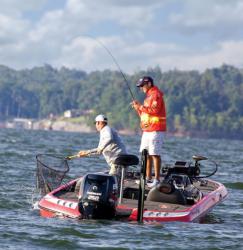 Bolton points to the recent success of West Memphis, Ark., pro Mark Rose as an example of fishing the moment. He notes that the Walmart pro has not used a “mechanized rotation” of previous GPS waypoints en route to winning four tour-level events and an EverStart Series Championship on the Tennessee River system, which is predominantly dominated by offshore, spot-to-spot fishing systems. Instead, Rose hunts new water each tournament and takes the time to learn about the schools of bass he is fishing for.
Bolton points to the recent success of West Memphis, Ark., pro Mark Rose as an example of fishing the moment. He notes that the Walmart pro has not used a “mechanized rotation” of previous GPS waypoints en route to winning four tour-level events and an EverStart Series Championship on the Tennessee River system, which is predominantly dominated by offshore, spot-to-spot fishing systems. Instead, Rose hunts new water each tournament and takes the time to learn about the schools of bass he is fishing for.
“From what I gather, Mark does not hit dozens and dozens of places in a day,” Bolton says. “He has maybe three to six key spots per tournament, but he is more tuned into the fish’s mood and movements in an area. He haunts them until they do what he wants them to, and then he takes advantage of that moment.”
The OFF! pro insists that in order to fish the moment on home lakes, locals must force themselves to explore new water and revisit areas that were once discounted as being “no good.” Instead of checking and rechecking old spots, he recommends investing that time in fishing completely new areas and/or patterns.
Part of his reasoning is a theory that GPS waypoints have a pretty short “shelf life” these days because lakes change, anglers get better and fish get conditioned.
“The longer you go without finding new spots, the staler the old spots become until they’re just not productive anymore,” Bolton suggests.
Over the last year he has spent many hours on Kentucky Lake exploring new water, warding off his “localitis,” as several pros refer to the habit of getting stuck fishing memories on their home lakes. He says he’s catching fish in places he has never fished before. And instead of running away from fish that won’t cooperate, he’s spending time graphing and relocating the fish to learn more about their movements. In the process, Bolton is learning more about some of his old hot spots and gaining valuable experience regarding fish activity that will apply wherever he goes.
Strike King pro Phil Marks of Dallas, Texas, would likely agree with Bolton’s cure for localitis. Marks is a well-known Sam Rayburn Reservoir icon who won the final 2012 Walmart FLW Tour Open on Rayburn. His enormous final-day limit of 32 pounds, 12 ounces blew the field away in a tournament where no previous limit had even cracked the 20-pound mark. Amazingly, despite years of experience on Rayburn, Marks caught the massive haul off a spot unfamiliar to him that he found during the official practice period.
“When I look back over the giant catches that I’ve had on Rayburn, they all have one thing in common,” Marks reveals. “They have always come off a new spot that I had just found. At the Open, I had certainly fished that general area before, but I had never noticed that little point sticking out of that particular drain until the week of the FLW Tour Open. That’s where all those big ones came from the final day.
“In order to find virgin schools of fish that never see a lure, you have to constantly explore,” he adds. “And that’s especially true on lakes you already know well.”
Erasing waypoints
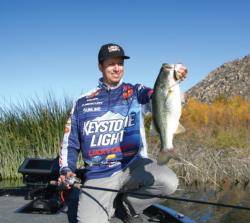 Fishing the moment doesn’t just apply to your local lake. It’s important when you go somewhere new, too, says Keystone Light pro Brent Ehrler.
Fishing the moment doesn’t just apply to your local lake. It’s important when you go somewhere new, too, says Keystone Light pro Brent Ehrler.
While many traveling tournament anglers would love a GPS full of promising coordinates to start practice, Ehrler suggests that’s a recipe for disaster. And that’s the exact reason why he erases all his waypoints after each tournament. His winning spots from his seven FLW victories were flushed from his GPS units long ago.
With so many hours logged on different lakes, you might wonder why he would do such a thing. On the surface, it seems those waypoints have tremendous value – right?
Not exactly. Deleting waypoints is one of his strategies for starting with a clean slate and fishing the moment.
“A difficult part of this business is keeping a fresh perspective on lakes you have visited several times,” Ehrler explains. “It’s just natural to want to go back and try places where we have caught fish before.
But how many times are tournaments won on the same spot the next time? Hardly ever. Lakes change. Weather changes. The forage base shifts. Fishing pressure gets applied. Bass are always in flux, adapting to their environment.”
That’s not to say that the Californian never goes back and fishes some of the same places where he has experienced success, but when he does, he wants to find the spot all over again. Revisiting waypoints becomes very routine, but the “re-discovery process” of searching those areas again is Ehrler’s favorite part about fishing and often leads to the discovery of even more and better details.
“I’ll find another little turn or corner that I did not even know was there the last time I fished it,” he says. “Forcing myself to re-find the old spot is the only way I can see with fresh eyes, so to speak. If there is a big waypoint on my screen from a past tournament it distracts me.”
Essentially, Bolton and Ehrler agree that while GPS technology is remarkable, waypoints – especially old ones – can become blinders that cause anglers to chase what once was, without seeing what is.
Ehrler breaks it down to an even more microscopic level that does not involve waypoints.
“The same thing can happen when fishing shallow,” he says. “Let’s say you have a good bank that has docks, laydowns and rock. The first time you fished that bank, you had bites off the docks only, but never got a bite off the laydowns or rocks between the docks. So you return to the bank in the tournament, start fishing docks only and suddenly your co-angler begins catching them off the laydowns and rocks in between the docks – targets that you wrote off based on previous experience.
“That’s why I love fishing new water,” Ehrler continues. “Fishing new water is fishing the moment because there are no judgments about what’s good or bad. On new water, I feel my way through an area with a lot of different baits and an open mind, giving the fish a lot of opportunities to show me what they are up to. But when I pull into a familiar place where I’ve had success before, the memories want me to repeat the same exact steps that produced last time – but conditions change and so do the fish.”
Try something different
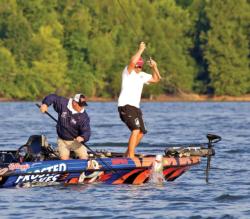 Kellogg’s Frosted Flakes pro Dave Lefebre has been on the Walmart FLW Tour for 10 years, and he knows all too well how the trappings of memories can hinder performance on lakes the tour repeatedly visits. One way the Pennsylvania pro avoids the repetitive ruts and keeps things fresh is to separate his tournament practice period into chunks with specific goals, including an entire day of practice dedicated to doing “off-the-wall stuff.”
Kellogg’s Frosted Flakes pro Dave Lefebre has been on the Walmart FLW Tour for 10 years, and he knows all too well how the trappings of memories can hinder performance on lakes the tour repeatedly visits. One way the Pennsylvania pro avoids the repetitive ruts and keeps things fresh is to separate his tournament practice period into chunks with specific goals, including an entire day of practice dedicated to doing “off-the-wall stuff.”
Normally, Lefebre spends the first day of practice doing the things that usually work on a particular lake for that time of year.
“On the second day of practice I like to put all the `normal’ stuff away and just go do crazy, off-the-wall stuff,” Lefebre details. “I might throw a big buzzbait in 2 feet of water at Beaver Lake or fish rock bluffs at Guntersville while everyone else is fishing grass. Or I might go to some part of the lake that everyone else has completely written off because `history’ says the fish don’t live there.”
Lefebre says his off-the-wall day keeps fishing fun and creative. And more importantly, it gives the moment – an odd pattern or overlooked part of the lake – an opportunity to shine.
Fishing “off the wall” brought Lefebre success on two occasions in 2012: an eighth-place finish at the Potomac River and a victory at Kentucky Lake.
“Once everyone got the grass beds down south on their brains at the Potomac, I spent a day of practice up near D.C. where no one was fishing,” Lefebre recalls. “I found a couple of key areas up there that I had all to myself, and it worked out well.”
Lefebre won the Kentucky Lake event by fishing much shallower than many others. While the masses tracked the tried-and-true out deep, Lefebre scoured the shallower flats in the 5- to 8-foot zone and found an overlooked mother lode on a small shell bed in the midst of a vast flat.
“Kentucky Lake was a perfect example of the off-the-wall practice day paying off big time,” he says. “I spent the first day looking deep like everyone else. On the second day, I just went fishing. I threw topwaters. I fished docks. I spent hours on flats throwing a Rapala DT6 along subtle contour lines. That’s how I found that winning spot on Kentucky Lake.”
Changes bring moments
Bolton contends that fishing the moment is deadlier these days because lakes seem to change so much faster than they used to, thanks to a growing list of powerful variables that can drastically impact enormous bodies of water quickly.
That list includes wild weather fluctuations that can bring flood and drought conditions; exotic species such as zebra mussels, gobies or blueback herring that impact forage bases; and powerful new fish-finding technologies in the hands of thousands of anglers who are able to uncover fish previously untapped. These factors – or better yet, a combination of them – can change a fishery fast.
“Seems like years ago, Kentucky Lake changed much more slowly, like every six to seven years,” Bolton says. “Nowadays it’s like the lake changes dramatically every two years. One year there’s record drought, and the next year it’s a record flood. One year you can’t find a stem of grass, and two years later it’s matted to the surface.
“We used to look at these lakes as giant, unchanging bodies of water,” he adds. “But in reality, these big impoundments really change rapidly.”
And the more dynamic a lake is, the more it opens up opportunities for fishing the moment.
Bolton points to the 2012 Forrest Wood Cup on Lake Lanier as a prime example. In 2010, when the Cup was previously held on Lanier, it was dominated by drop-shotting out deep.
“Look at how much Lanier changed in just two years,” Bolton opines. “[In 2012] the water was much lower, there were bream beds all over the banks and the largemouth population had made some big gains since the last time we were there. We all went to Lanier with drop-shotting on the brain because of what happened in 2010, and Jacob Wheeler comes in with no previous experience on the lake and blows it away fishing shallow. Now that’s fishing the moment.”
Avoiding attachment
In trying to fish the moment, Ehrler warns against getting too attached to areas or too “locked in” on patterns in multiple-day events with multiple-day practice periods.
“Sometimes I hear guys say they have patterns `dialed-in’ by the first day of practice when there are still two or three days to go until the tournament even begins,” Ehrler says. “Sometimes patterns can hold up for long periods of time, but seldom is that the case for me. I don’t even bother refining patterns during practice anymore. If I get a bite or two doing something in an area, I pick up and leave. If I’m going to do any refining or `dialing in’ I want to do it on tournament day.”
After all, in the ever-changing landscape of tournament bass fishing, the only moment that counts is the final moment, when the bags are weighed and the winner is announced. More often than not, the winner is the person best able to handle the conditions of the day, no matter what happened in the past.